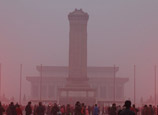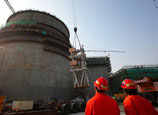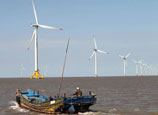
NEW YORK, Jan. 26 (Xinhua) -- Apple lost its title as the world's most valuable publicly listed company to oil giant Exxon Mobil after remaining on the throne since August 2011.
The dethronement of the tech giant came just after it published a lower-than-expected quarterly earnings report. Market watchers and consumers worldwide are wondering whether Apple could reclaim its glory?
Analysts did not give a "nay," while admitting challenges ahead, especially the company's ability to carry forward its innovation legacy and tap into the Chinese market to win back consumers' hearts.
VALUE VAPORIZING
As the stock market closed on Friday, Apple's shares slid by 2.36 percent to 439.88 dollars per share for a market value of around 413 billion U.S. dollars, second to Exxon's some 418.2 billion.
With almost a month into the new year, Apple's shares slumped 17.3 percent, including a more than 12 percent free fall made a day after the release of its lackluster earnings.
Compared with its historical intraday high of 705.07 dollars per share set on Sept. 21, its price has retracted by 38 percent, with about 250 billion dollars vaporized in market value, which almost equals to that of Google.
In the quarter ending Dec. 29, Apple made a record-high profit of 13.1 billion dollars on revenue of 54.5 billion, yet still less than Thomson Reuters' prediction. Apple sold a record 47.80 million iPhones and 22.90 million iPads. But the performance also missed analysts' forecast.
WHAT TRIGGERS THE FALL
Clearly the fall was triggered by Apple's weak earnings, but a lack of innovation in Apple's latest products that can "wow" the market is a crucial reason.
"They've got no blockbuster product on the horizon yet," said Kenneth Polcari, a trader of O'Neil Securities.
"Investors have gotten so used to Apple coming out with some major blockbuster announced every single time. But they disappointed them," Polcari told Xinhua.
Besides, the company has a poor use of cash. "They've got more money in their balance sheet and they didn't announce anything to do with that money," Kenneth said. Not an acquisition nor a stock buyback, he added.
Apple seems to be "wasting its massive hoard of cash by letting it sit, instead of increasing value of the company through acquisitions, more expansion plans, or other value-added initiatives," Helix Investment Management echoed the idea in a report on the U.S. stock market analysis website Seeking Alpha.
Another reason is that Apple's high-end strategy is squeezing its market share amid rising competition and heating patent wars on the smartphone and tablet market.
Apple's archrival Samsung, in comparison, reported cheerful fourth-quarter earnings that surprised the market.
Samsung earned a record-high quarterly profit of 7.04 trillion won, or 6.6 billion dollars, surging 76 percent year-on-year. Its flagship Galaxy S III smartphones and Galaxy Note II tablets also oversold its counterpart.
In the fourth quarter, Samsung took up roughly 40 percent of the smartphone market compared with Apple's around 30 percent, according to Strategic Analytics.
For the whole year in 2012, Samsung's market share grew from 19 percent in 2011 to 39.6 percent, while Apple's market share made a slower growth from 18.8 percent in 2011 to 25.1 percent in 2012.
In addition, an ongoing patent war between Apple and other tech giants caught Apple in an even awkward position, including a law suit filed by Apple in mid-2011 against Samsung for infringing several of its patents and a short-term break up with Android system-based Google when Apple temporarily deleted the most popular app Google Map from its app store last September.
A number of Chinese smartphone makers with enticing low-price smartphones also post a threat to Apple's high-end products.
These competitors are "attempting to dethrone Apple from its unreachable position," as Yoni Jacobs, executive director and chief investment strategist for Chart Prophet, phrased it.

















 Buildings collapse after subsidence in S China
Buildings collapse after subsidence in S China


![]()
